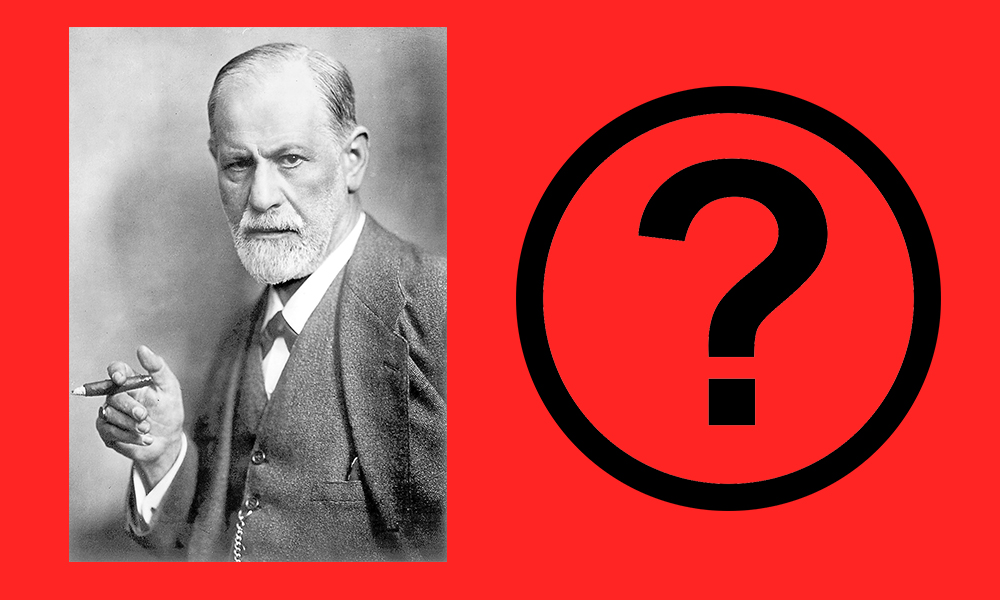What if scholars instead mostly wrote sketchbooks? What does it look like to write while reading? Over time, I have prepped for this dialogue column by drafting question-sets for Sigmund Freud (progeny of Plato, clinician of the question genre), based on 60 of his books and articles. Each question-set corresponds to the length of Freud’s respective publication, and to the number of chapters it contains. Earlier this week, I dreamt I was copyediting Freud’s answers. So, in honor of the dream, here are a few case studies from the early 1920s.
¤
The Ego and the Id
1. I agree research has directed interest too exclusively to the repressed…find especially intriguing how this book’s conceptual deployments differ from everyday senses of the terms “super-ego” (here id’s libidinal representative…rather than prudish rival) and “ego” (residue of complexes…of responses to lost erotic object…itself incorporated in desperate attempts to woo the id)…so could we start with a model for ego mechanism borrowed from ordinary experience…for seeking to regain the object (and / or attention it receives) by becoming it…by reading?
2. With repeated Ucs. / Pcs. / Cs. distinctions…with Ucs. prompt relatively formless…with Pcs. status implying linguistic representation…with Cs. perception demanding tactile lived equivalent…some memory trace…and with ego’s Pcpt.-Cs. system operating as superficial sensory apparatus…don’t we approach equation to the reading (compelling / conceiving / sounding / writing) process?
3. You characterize thinking-in-pictures as incomplete…inexpressive endeavor (“We learn that what becomes conscious in it is…only the concrete subject-matter of…thought…that…relation between…various elements of…subject-matter…which is what specially characterizes thoughts…cannot be given visual expression”)…and…if we extend this point to a critique of isolated…extrapolated concepts let’s say (cut off from syntactical…rhetorical…structural context)…can’t we invoke reading as exemplary embodiment of two-fold instinct…with disruptive erotic libido clamoring for life even as constancy-affirming pleasure principle pulls toward death (doesn’t all that happen as one reads…reflects…returns to text)?
4. Strachey cites Groddeck for the “lived by” concept…yet does at least acknowledge Nietzsche’s pioneering use of “id”…yet even before your distillation of world into two basic (static…active) drives begins to recall Birth of Tragedy’s punning diptychs and internalized dialogue and existence as aesthetic phenomenon…your diagram…with portrait of ego as but tenuous extension of id…returns me to Nietzsche’s metaphor of human consciousness riding the tiger’s back…but just then you offer your own horseback analogy (of ego…at best…directing id where the id wants to go)…but doesn’t this image also allegorize reading?
5. Again amid conjectures on our super-ego’s primal pedigree…its retooling both of infantile fixations and primitive passions…will you ever question inheritance…its broadest genetic / linguistic / behavioral brackets…or with your Lamarckian wish-fulfillment (with one’s lived experience passed down through generations) provoking related speculation…does reading alter ontogeny of the reader…phylogeny of the species?
The Economic Problem of Masochism
As Oedipus complex gets doubled…twice (attached both to mother and father…resolved by moral overcoming that…alas…re-sexualizes…re-opens the complex)…as Nirvana principle gets posed…further illuminating pleasure-principle operations (complicating reductive takes in which release inevitably provides pleasure…in which tension always produces pleasure’s opposite)…you point to potential impact of “rhythm…the temporal sequence of changes…rises and falls in…quantity of stimulus” shaping qualitative experience…so that your conceptual apparatus keeps spinning let’s say…shifting mobile-like even as your fixed…permanent…collected corpus continues to consolidate…to sturdy (though with the id’s atemporal…contradictory realm ranging inside)…and I get thrown back on reading about “wish to be beaten by the father” coming from sadistic-anal phase…recall afternoons spent with my brother…relive thrilling…restorative necessity to report getting in trouble again…this time as exquisite moral masochism…learn that “neurosis which has defied every therapeutic effort may vanish if…subject becomes involved in the misery of an unhappy marriage…or loses all his money…or develops…dangerous organic disease”…and think of how well I treat myself (only?) during crisis moments…then reach your concluding claim that “even the subject’s destruction of himself cannot take place without libidinal satisfaction” and wonder…does every reading act embody (and masculinist) masochism in an economic sense?
Negation
Questions provide unifying affirmation let’s say or purgative negation?


